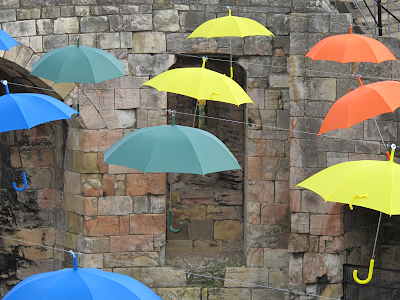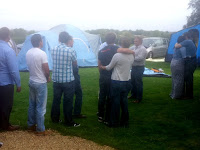Haven't we all heard this question? 'If there's a Creator, why does he allow suffering in the world?'
Or it might be, 'Why did he let my wife/husband/child/parent/friend die?', or ,'Why didn't he stop a terrorist incident?'.
Why are there earthquakes, why is there disease?
It's a question that comes from a great missing of the point. Our Father didn't promise us lives without trouble. Indeed, Yahshua specifically told his followers that they would face severe trouble in the world.
He himself faced ridicule, scourging, and a ghastly death. Why would we expect to suffer any less? And if we who have trusted in him and follow him face hardship, danger and loss, why would those who have not trusted and followed expect a better deal?
The fact is, he did not necessarily come to bring us health and happiness and security in this life, he came to set us free and pour into us the essence of a new life - a life that will never end. We begin to live the new Kingdom life now even while we still struggle daily in our old, temporary lives.
We rarely think about the alternative to a universe in which suffering is allowed. The alternative would be no free will, no self determination. Only chaos (in the mathematical sense) makes life possible.
Why is this so hard to grasp, so hard to come to terms with?
Perhaps it all depends where we are standing as we review the situation.
The view from this world - Looking at it from the perspective of this life alone it is natural for people to want comfort and security. If we expect to die and pass into an empty obscurity, why would we search for anything else but benefit now? More money, more fun, better health, more happiness, more time, less work, more to eat but a slimmer body, less working out but better fitness, less effort but more achievement. Are these reasonable goals? No!
As long as we think of heaven as a place of lazy happiness and easy joy we are trying to find the wrong reward. And if the truth be known, we are still wanting to enjoy that reward in this life.
The view from the kingdom of heaven - But Christ did not come to reward us. We did not (and cannot) earn a reward. We are too often like children opening a wrapped gift and saying, 'But I didn't want a key, I wanted a doll's house. This comes from a failure to understand from a grown-up perspective. Which is best for us, a doll's house now or the key to our Father's house so we can freely come and go?
We need to learn to live our lives from this new perspective. It's not healing now, or food now, or safety now that truly matters. By comparison with receiving the heavenly and eternal healing, food and safety and having them in the here and now are of little value.
Heaven invades the world - And if this is all true, why do we see people healed when we pray for them? Why did Yahshua tell his followers, 'Ask anything in my name and it will done for you by my Father in Heaven'?
One of the greatest joys and privileges we have as believers is the gift of being able to come to the Father in the name of the Son. It is one of the means by which the kingdom of heaven invades this physical universe in which we live. Other ways include direct communication through the action of the Holy Spirit in our hearts, through dreams and visions, in prophecy and teaching, words of comfort and wisdom, and above all the growing knowledge believers have of the Father's heart and nature.
Some will say, 'But it doesn't always work!' This is true, sometimes we pray for healing and there is no perceived change. It might be due to lack of faith in the heart of the one who asks or of the one who is prayed for. But it might also be because we have not clearly heard the Father's will and purpose. It may be because we give up instead of persisting in prayer. And sometimes it may even be because the hard experience is essential for our eternal well-being or for someone else's.
We need to become like Yahshua who said, 'If it's possible, let this cup pass from me. But even so, Father, let your will be done here, not mine.'
Isn't this what Paul had in mind when he wrote, 'Let your bodies be made spiritual sacrifices'? We must lay down our lives daily. Lay them down and not take them up again. Lay them down and leave them for Papa to use and bless in his own way and at a time of his choosing.
And while we are here, in this world, it is our responsibility to help other people whenever we have the means to do so. We must pray for the sick and feed the hungry. We are the hands and feet of Jesus.
Questions:
- What does it mean to you, personally, to 'let your body be made a spiritual sacrifice'?
- How do you answer someone who says that unanswered prayer shows you lack faith?
- Has anyone ever said that to you or someone you know?
See also:
- Chaos theory - Wikipedia
- God and suffering - Christianity explored
- Knowing the love of Christ - Assembling of the church
- Living in two worlds - Lifestream
- Suffering - T Austin-Sparks









